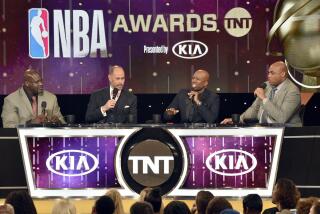Turner Acquires Rights to 1,000 Columbia Films : Media: The deal will provide programming for the company’s two cable television networks.
- Share via
Ted Turner is back. Back from the yawning cavern of debt, and apparently back in Hollywood to discuss the possible purchase of MGM/UA Communications Co. from financier Kirk Kerkorian.
On Wednesday, his Turner Broadcasting System also announced that it has acquired rights to 1,000 Columbia Pictures films for two of TBS’ cable TV services. Terms of the deal were not disclosed, but the announcement was interpreted as one more sign that Turner has a hit with its newest cable network.
For those with spotty memories, Ted Turner is the fellow who nearly lost his company by paying $1 billion for the MGM film library three years ago. The deal left him heavily in debt, and Turner chose to bring in a group of powerful cable TV operators as investors who have veto authority over his moves. At the time, Turner was said to have gone to Hollywood “fully clothed and left in a barrel,” as the Wall Street Journal put it.
Turner put the films to work on a new ad-supported cable network called Turner Network Television, and he’s back to buy more. To pull off another $1-billion-plus acquisition, however, he’ll need the backing of Tele-Communications Inc. and Time Warner Inc., his most powerful but sometimes quarreling shareholders.
For now, Turner apparently has encouragement from Time Warner and TCI Chief Executive John Malone to investigate ways to acquire MGM/UA, whose biggest asset is the 1,000-title United Artists film library. (Turner briefly owned the UA library in 1986, before reselling it to Kerkorian for $470 million.)
“It’s not going to be done by just TCI or just Turner,” said one investment community source who is close to both companies. “It’s a question of the right partners.” The same source confirmed that Malone’s emissaries have pored over MGM/UA’s numbers in recent weeks.
Another source has indicated that Time Warner might condone a bid if it is proposed as an exchange of stock. Turner shares have been trading near in the mid-$50s recently, compared to a 52-week low in the $14 range.
On Wednesday, speculation mounted after the New York Times reported that Turner and Kerkorian met a day earlier at the Bel-Air Hotel. At Turner headquarters in Atlanta, however, a company spokeswoman declined comment, and MGM/UA Chairman Jeffrey Barbakow did not return a reporter’s call.
Even though Turner’s grander moves are now controlled by his large shareholders, the cable entrepreneur has won new respect for his gamble of three years ago. In the last few months, Turner has refinanced $1.4 billion in long-term debt, and the company recently increased its bank borrowing capacity to $1.2 billion, up from $250 million.
In Hollywood and on Wall Street, “They’re not laughing anymore. He basically has an asset now that is worth almost as much as the library, and he still owns the library,” said Larry Gerbrandt, an analyst with Paul Kagan Associates in Carmel. “People are talking about (Turner Network Television) being worth $800 million.”
TNT, the advertising-supported network launched by Turner one year ago, is “just doing fabulously,” Gerbrandt said. “In terms of cash flow, it’s doing better than CBS in a bad year. It made money its first year.”
Gerbrandt estimated that the two-year licensing deal with Columbia Pictures is worth “eight figures” and said the move probably indicates an acceleration in Turner’s plans for TNT by introducing more variety in films.
The films date from 1935 to 1983 and include such hits as “Tootsie,” “The Big Chill,” “Close Encounters of the Third Kind,” “Funny Lady” and “Kramer vs. Kramer.” Some of the older films are “Suddenly Last Summer,” “The Bridge on the River Kwai” and “Mr. Smith Goes to Washington.”
The licensing agreement was made on behalf of TBS SuperStation as well as TNT.
More to Read
The biggest entertainment stories
Get our big stories about Hollywood, film, television, music, arts, culture and more right in your inbox as soon as they publish.
You may occasionally receive promotional content from the Los Angeles Times.










